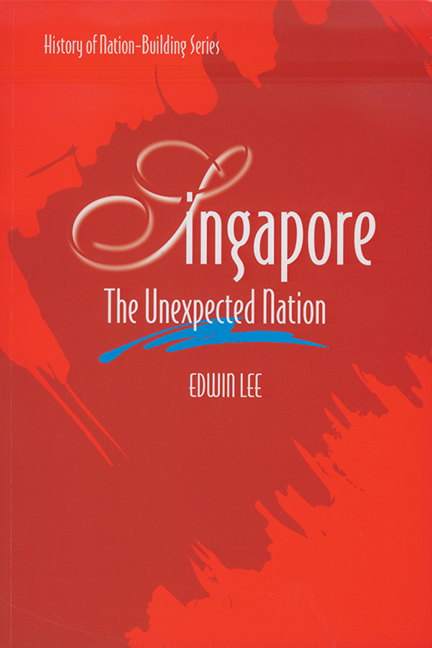Book contents
- Frontmatter
- Dedication
- Contents
- Preface
- Introduction by Wang Gungwu
- Chapter One Beginnings: From Temasek to Singapore
- Chapter Two Race, History and Nationalism
- Chapter Three Contestants and Contesting Visions
- Chapter Four The Accidental Chief Minister
- Chapter Five The Terminal Chief Minister
- Chapter Six The Embattled Prime Minister
- Chapter Seven Merger: Contesting Ownership and Principles
- Chapter Eight Terms of Disendearment
- Chapter Nine Dare to be Equal
- Chapter Ten The Way to Survive
- Chapter Eleven National Service: The Price of Independence
- Chapter Twelve Politics of Education
- Chapter Thirteen Home Ownership, National Stability and the New Middle Classes
- Chapter Fourteen University and Nation
- Chapter Fifteen Toh's Nation-Building Thrust
- Chapter Sixteen Nantah: Between Community and Nation
- Chapter Seventeen Self-Renewal: Talents for a Tough Act
- Chapter Eighteen The Consensual Prime Minister
- Chapter Nineteen Confucianism, Christianity, Chineseness
- Chapter Twenty Singapore Dreams, Singapore Dilemmas
- Chapter Twenty-One The Hyphenated Singaporean
- Chapter Twenty-Two The Unexpected Nation
- Bibliographical Note
- Index
- The Author
Chapter Nine - Dare to be Equal
Published online by Cambridge University Press: 21 October 2015
- Frontmatter
- Dedication
- Contents
- Preface
- Introduction by Wang Gungwu
- Chapter One Beginnings: From Temasek to Singapore
- Chapter Two Race, History and Nationalism
- Chapter Three Contestants and Contesting Visions
- Chapter Four The Accidental Chief Minister
- Chapter Five The Terminal Chief Minister
- Chapter Six The Embattled Prime Minister
- Chapter Seven Merger: Contesting Ownership and Principles
- Chapter Eight Terms of Disendearment
- Chapter Nine Dare to be Equal
- Chapter Ten The Way to Survive
- Chapter Eleven National Service: The Price of Independence
- Chapter Twelve Politics of Education
- Chapter Thirteen Home Ownership, National Stability and the New Middle Classes
- Chapter Fourteen University and Nation
- Chapter Fifteen Toh's Nation-Building Thrust
- Chapter Sixteen Nantah: Between Community and Nation
- Chapter Seventeen Self-Renewal: Talents for a Tough Act
- Chapter Eighteen The Consensual Prime Minister
- Chapter Nineteen Confucianism, Christianity, Chineseness
- Chapter Twenty Singapore Dreams, Singapore Dilemmas
- Chapter Twenty-One The Hyphenated Singaporean
- Chapter Twenty-Two The Unexpected Nation
- Bibliographical Note
- Index
- The Author
Summary
Singapore was in Malaysia, but without love, and with instead, much illwill. The conflict between Singapore and the central government dominated all else within Malaysia. At the same time the new federation was under serious threat from without as Sukarno stepped up his confrontation agenda. Confrontation guaranteed that the Western bloc powers would be focused on the troubled region. Britain, whose forces were engaged in defensive action, and America, Australia and New Zealand, all inter-linked as allies, cast their anxious eyes on Malaysia, the victim, and Indonesia, the aggressor. This created a rare opportunity for the contending leaders within Malaysia to draw strength from this international group of Western powers to support their internal struggle against each other. The Western powers in question were out to influence the leaders of Malaya and Singapore to conform to their strategic and political interests in the region. But on this score, they came up against the assertive nationalism of the Malayan and Singaporean leaders who were determined to have their own way. While these leaders looked upon the Western powers as a valuable resource to tap into, they made it very clear that they should be in charge of their own destiny. This limited the capacity of the Western powers to affect the course of the internal struggle in Malaysia, and of the confrontation outside it sustained by Sukarno.
Singapore's Prime Minister Lee believed that, for the Malaysian nation to succeed, all who belonged to it, regardless of race, religion, or creed, should be equal. This was his abiding nation-building imperative. When, as a budding nationalist, he addressed the Malayan Forum all those years ago, he had emphasized the importance of a Malayan Malaya over a Malay Malaya, a Chinese Malaya, an Indian Malaya, and an Eurasian Malaya. This idea became the founding principle of the PAP, which he led to victory and into merger. The experience of the final stages of the merger negotiations, amid signs that the Tunku was seeking to replace him with a more amenable leader, was a brutal reminder to him not to assume equality as a matter of right, but to be prepared, if necessary, to fight for it.
- Type
- Chapter
- Information
- SingaporeThe Unexpected Nation, pp. 239 - 264Publisher: ISEAS–Yusof Ishak InstitutePrint publication year: 2008

